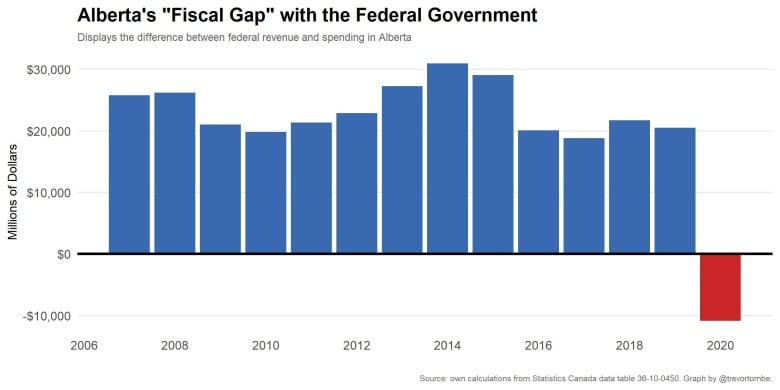For the first time in decades, Alberta received more federal support than it raised in revenues last year, new data from Statistics Canada shows — and was also the largest recipient of COVID-related federal spending increases in Canada.

For the first time in decades, new data from Statistics Canada suggests the federal government spent more money in Alberta than it raised from tax revenues in the province last year, a Calgary economist says.
When the pandemic shuttered businesses and reduced work hours across Canada in 2020, emergency fiscal support flowed from the Government of Canada across the country.
This spending included wage subsidies, rent subsidies, boosted child benefits, topped-up employment insurance (EI) payments and forgiven loan repayments.
According to numbers released by Statistics Canada on Monday, Alberta was the largest recipient of COVID-related federal spending increases per person in the country.
In Alberta alone, the federal government also spent nearly $12 billion in business subsidies, while nearly 1.1 million Albertans received Canada emergency response benefit (CERB) payments.

Additionally, there were also transfers from the federal government to the Alberta government itself, to help offset some health-related cost pressures created by the pandemic.
When you add it all together, it’s about a $30-billion increase in the amount of federal spending in Alberta, according to economist Trevor Tombe.
“Which is basically double what you normally see in a typical year,” he told CBC News.
“What this reflects is that federal spending really ramped up dramatically in the pandemic, and Alberta was actually the largest recipient of that increase [per person].”
Albertans benefited significantly: Tombe
There are a lot of reasons why Alberta’s economy typically outperforms other provinces in the country, according to Tombe.
Oil and gas has been a highly profitable industry that generates a lot of income for shareholders and workers, and royalties to the government, as well.
But Alberta’s productivity is also higher overall in most sectors than what is seen in other jurisdictions, Tombe said — in part because it has a younger population that yields more workers.
“So that does tend to result in higher tax payments to the federal government, just because higher income means higher taxes, because that’s really an unavoidable consequence of having an income tax,” Tombe said.
“Because Alberta is home to a disproportionately large share of high-income individuals … Albertans tend to, on average, pay more in federal taxes. And that’s largely because we’re high-income relative to other provinces.”
Last year, however, he says the province received more in federal spending than it raised in tax revenue — a first since 1965.
“What this tells me is that Alberta, and Albertans, benefited significantly from the federal government’s response to COVID,” Tombe said.
“And I think it shows some of the benefits of being a part of a broader federation where we can pool risks.”
Albertans still contributed disproportionately, UCP says
Lori Williams, a political science professor at Mount Royal University, also said the figures provide a better overall picture of the fiscal relationship between Alberta and the rest of the federation.
“And knowing that, it’s not quite as out of balance as it appears, when you just look at something like equalization,” Williams said.
However, Kassandra Kitz, the press secretary for Alberta Finance Minister Travis Toews, said in an emailed statement that the share of equalization payments coming out of Alberta still amounted to more than it should have last year.
“In 2020, 14.4 per cent of federal revenues were generated in Alberta, well above Alberta’s 11.6 per cent share of the national population,” Kitz said.
“This means that Albertans still contributed disproportionately to the rest of the federation. As for net fiscal contribution, in per capita terms, Alberta was still the smallest net fiscal recipient among provinces in 2020 ($3,189 per capita). This was slightly over half the average amount for all provinces ($5,858 per capita).”

Kitz also said that federal emergency COVID spending was financed through increased federal debt.
“Simply put, the federal government increased the debt burden on Canadians, and Alberta was still the smallest net fiscal recipient (in per capita terms),” Kitz said.
“This federal debt will have to be repaid and when this happens, a disproportionate share of this COVID-incurred debt will continue to come from Alberta’s taxpayers.”
A fiscal blip
While 2020 was a fiscal blip in many ways, Tombe says, this provides a larger picture of how Alberta’s economy weathered the pandemic.
“And it didn’t actually weather it that well,” he said.
The contraction of Alberta’s overall economy in 2020 was 7.9 per cent, Tombe said — a larger drop in economic activity than any other province.
“We were hit particularly hard from the pandemic,” Tombe said.
“But another part of it is low oil prices through 2020 really being a big blow to the economy overall.”
Kitz, however, says many economic forecasters — “including the Conference Board of Canada and some of Canada’s largest banks” — predict Alberta will lead the provinces in growth this year.
“In 2020, all provinces had negative contributions to the federation, due to the one-time impacts of COVID and related federal emergency response measures,” Kitz said.
“In terms of real GDP, in Q1 we reported that it is now expected to grow by 6.7 per cent this year. This is up significantly from the growth of 4.8 per cent expected in Budget 2021.”

